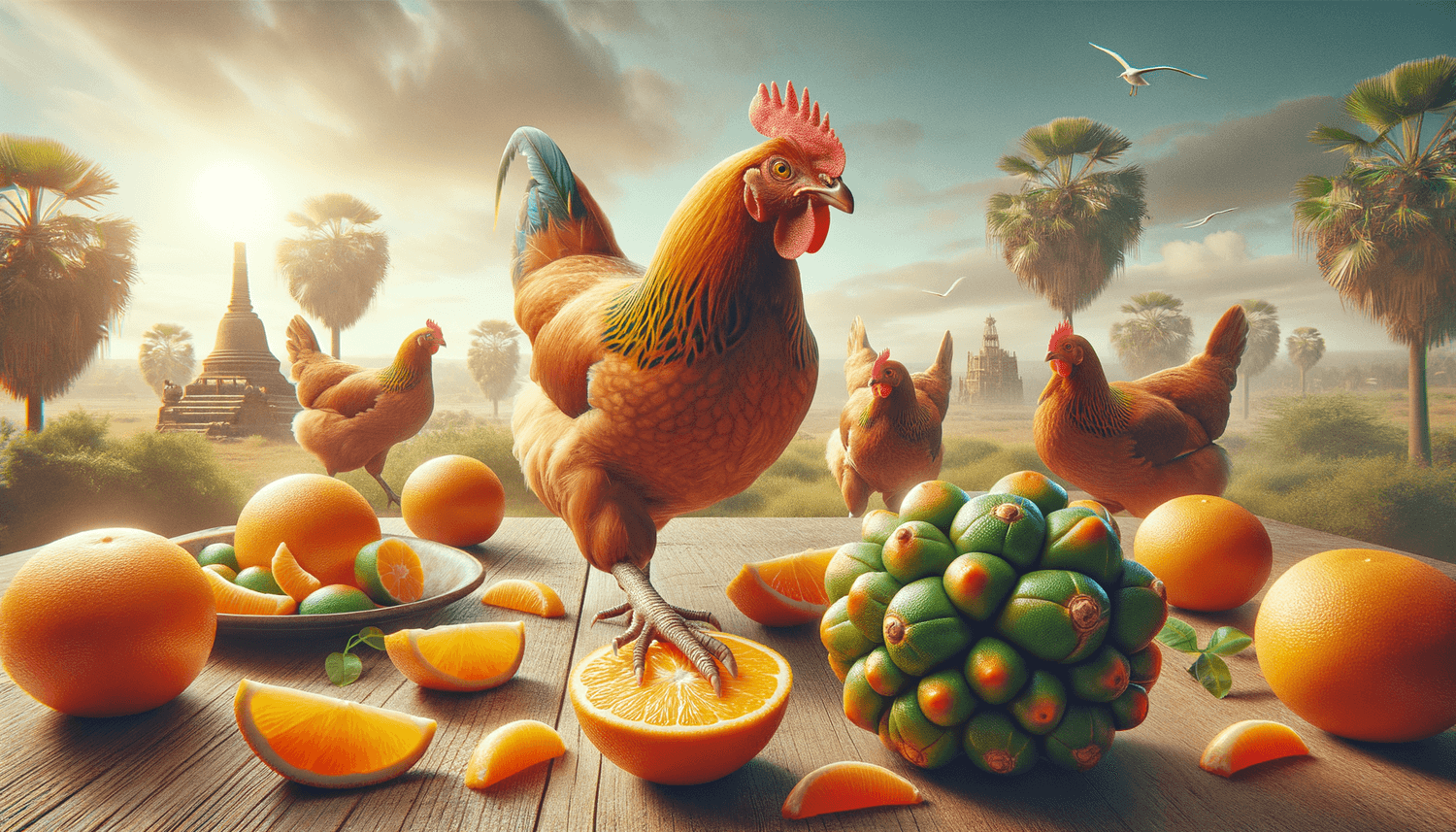Hey there, fellow feathered-friend enthusiast! If you’re anything like us, you’re constantly on the look out for new and interesting treats for your beloved backyard buddies. So, we bet you’re cluckin’ curious about the ugli fruit and whether your chickens can feast on this odd-looking, yet surprisingly delicious delight. Get ready to scratch beneath the surface as we explore the ins and outs of ugli fruit, discuss the importance of a balanced diet, dive into the benefits and potential risks, examine the nutritional value, and share tips on how to prepare this yummy snack for your brood. So, fluff up your feathers and let’s cluck on!
Can chickens eat ugli fruit?
Yes, chickens can safely eat ugli fruit. This unique citrus hybrid is not toxic to chickens and can be a tasty, vitamin-rich addition to their diet. However, as with all treats, moderation is key — so be sure to offer ugli fruit in small amounts alongside a well-balanced diet to ensure your flock remains healthy and happy.
A balanced diet for backyard chickens
Just like us humans, chickens require a well-balanced diet to stay healthy and thrive. A chicken’s diet should primarily consist of a high-quality chicken feed, which provides the right blend of proteins, vitamins, and minerals necessary for their growth and egg production. It’s essential that chicken feed makes up around 80-90% of their diet to ensure they’re getting all the nutrients they need.
The remaining 10-20% of your chickens’ diet can consist of treats like fruits and vegetables, which not only add variety and excitement to their meals but also offer additional nutrients. While treats like ugli fruit can be a delicious and nutritious supplement, always remember to offer them in moderation to maintain a balanced and healthy lifestyle for your feathered friends.
Nutritional value of ugli fruit for chickens.
Feeding ugli fruit to chickens provides them with a variety of nutritional benefits. Ugli fruit, like other citrus fruits, is a great source of vitamin C. Vitamin C is an antioxidant that helps chickens maintain their immune system, keeping them healthy and better equipped to fight infections.
Besides vitamin C, ugli fruit also contains other essential vitamins and minerals that can be beneficial for your flock. It is rich in dietary fiber, which can aid digestion and help keep their gastrointestinal tract in good condition. Ugli fruit is also a source of potassium, which aids in maintaining proper muscle function and fluid balance in your chickens’ bodies.
In addition to its vitamin and mineral content, ugli fruit can provide hydration for your chickens. With its high water content, ugli fruit can help keep your flock hydrated, especially during hot summer days, when access to fresh water might be limited or less frequent. Overall, ugli fruit offers a combination of nutrients and hydration that make it a valuable addition to your chickens’ diet when fed in moderation.
Nutrition table of ugli fruit for chickens.
| Information | Description |
|---|---|
| Nutritional Value | Rich in vitamin C, dietary fiber, and potassium, ugli fruit provides antioxidants, supports digestion, and maintains muscle function, fluid balance, and immune health. |
| Suggested Serving Size | Small portions, ensuring that treats like ugli fruit make up no more than 10-20% of a chicken’s diet. |
| Safe Feeding Practices | Feed in moderation, always ensuring that high-quality chicken feed is the primary component of their diet. |
| Preparation | Remove seeds and peel, then cut the fruit into bite-sized pieces for easier consumption before offering to chickens. |
| Potential Risks | Overfeeding can lead to an unbalanced diet and nutrient deficiencies; too much vitamin C could potentially cause soft-shelled eggs in laying hens. |
| Hydration | Ugli fruit has high water content, offering additional hydration to chickens, which is especially beneficial during hot weather. |
| Digestion | Dietary fiber in ugli fruit can help support healthy digestion by maintaining the gastrointestinal tract. |
| Seasonal Availability | Ugli fruit can typically be found in the winter and spring months, offering a fresh and packed with nutrients treat during this time. |
| Other Benefits | Offers a tasty, vitamin-rich treat, adding variety to a chicken’s diet and encouraging natural foraging behaviors. |
Feeding ugli fruit safely and effectively
It’s important to remember that ugli fruit, like all treats, should be introduced gradually and served in appropriate quantities. Monitor your chickens’ reactions when trying ugli fruit for the first time, as individual birds may have different preferences and sensitivities. Always ensure that the ugli fruit is fresh and free from mold or rot to avoid introducing harmful bacteria or toxins to your flock.
Preparation tips for ugli fruit
To prepare ugli fruit for your chickens, first remove the seeds and peel, as these parts are difficult for chickens to digest. Cut the fruit into small, bite-sized pieces to make it easier for your chickens to consume. While it’s important to wash the fruit before feeding it to your chickens, avoid allowing it to become too wet or soaked, as this can lead to undesirable smells and attract pests in the chicken coop.
Other fruit alternatives for chickens
While ugli fruit can be an enjoyable treat for your flock, there are plenty of other nutritious options to consider as well. Other fruits to introduce into your chickens’ treat repertoire include blueberries, spearmint, kiwi, and cucumber. Mix and match different fruit varieties to provide your chickens with a diverse and well-rounded diet.
In conclusion, ugli fruit can be a delightful and beneficial addition to your chickens’ diet when fed in moderation. By following safe feeding practices and ensuring proper preparation, you can provide a diverse and nutritious array of treats to keep your flock healthy and thriving.

















